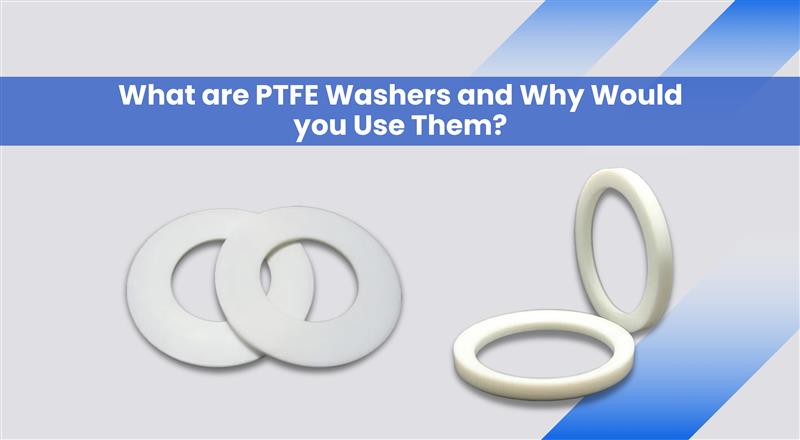PTFE washers might sound technical, but they are simple parts found in many daily uses. Many machines and tools use these components, but people rarely see them every day. PTFE washers serve fundamental functions that support many applications. Washers are important in plumbing, electronics, vehicles, and food production. Washers help keep positions steady and also prevent damage to equipment.
In this blog, we will explain about PTFE washers. You will learn about how these components work and why people and industries use them. We will analyze the benefits of these components. We will also look at their common uses and how they differ from regular washers.
What is a PTFE Washer?
The PTFE washer consists of a thin circular disc that contains a central opening. The PTFE washer has a typical washer shape. It is made from polytetrafluoroethylene. People know this material for its smooth feel, strong durability, and chemical resistance. PTFE is the non-stick layer that protects your regular frying pans. The material stays stable under heat and pressure. It also resists corrosive liquids. With these advantages, the PTFE washer is useful for various heavy-duty tasks. Someone places the washers between two surfaces to lessen friction or bridge gaps. An extra use could be to stop leaks. Tightening bolts or screws also smooths the pressure distribution.
Why Use PTFE Washers?
Many industrial sectors rely on PTFE washers because of their strong characteristics. These washers prove exceptional durability, together with safety and excellent performance characteristics. Let’s look at the main reasons people choose PTFE washers for their needs:
Excellent Resistance to Heat and Cold
These PTFE washers handle extreme temperatures. The material remains intact without cracking or melting regardless of temperature conditions. The material maintains its stability during harsh operating conditions. These materials provide high performance in both indoor environments and outdoor settings.
Waterproof and Non-Stick
PTFE washers do not absorb water or allow for moisture transmission. Their surfaces stop materials from building up because they don’t stick. The non-stick quality of these materials is key for making food and drugs. The system maintains its cleanliness while achieving better performance and an extended lifespan.
Non-Conductive and Insulating
Also, the washers don’t conduct electricity. So, they offer great protection for electrical parts. Being a good insulator, PTFE prevents short circuits in sensitive electronics. It finds extensive applications in appliances and control panels.
Durable and Long-Lasting
PTFE washers are less prone to wear. These materials resist pressure, bending, and environmental influences. Long-lasting performance cuts down on replacements. This saves both time and money.
Safe for Food and Medical Use
PTFE is non-toxic, making it safe for food and medical use. The substance remains free from releasing dangerous substances at high temperatures. The material is widely preferred for use in hospitals, kitchens, and clean rooms.
Corrosion-Resistant
PTFE is different from metal washers. It stays stable when it faces air and moisture. The material is very useful for plumbing systems and marine equipment. The components often face water or humid air.
How to Choose the Right PTFE Washer?
You base your choice of the correct PTFE washer on how and where you intend to use it. A few of the factors to consider include:
- Size: The washer needs to fit the bolt or screw sizes exactly. This ensures a strong connection.
- Not for Very Heavy Loads: The sealing effectiveness of washers improves with increased thickness. However, thickness may prevent the washer from passing through narrow openings.
- Cost: Choosing washers with strong resistance is a top priority for chemical plants. Electronic equipment requires insulating materials as preferred washers.
Always consult an expert or a machine manual for every case.
Common Uses of PTFE Washers
The PTFE washers have applications in several fields. These areas that find common use for them are:
- Automobile: Automobile components include systems like engines and brakes. They help stop heat damage and chemical reactions.
- Aerospace: Aerospace manufacturers choose this material for plane parts. It offers high strength and low weight.
- Medical Equipment: PTFE is clean and safe. So, medical instruments and appliances use it.
- Food Processing: The food processing industry chooses this material for many food tools. It is non-toxic and has non-stick properties.
- Electronics: Electronics use this technology to protect their parts from heat damage and moisture.
- Plumbing: The material in plumbing stops leaks in pipes and faucets. It also helps prevent moisture absorption, rust, and decay.
Why Are PTFE Washers So Popular in Modern Industries?
Today, industries want parts to be strong, clean, and reliable based on one main trait. PTFE washers provide all these characteristics in this very simple principle. They improve machine operation, keep them clean, and extend their lifespan. Safety is of utmost importance in medicine, food, and chemical industries.
PTFE washers are non-toxic, non-reactive, and approved for such safe use. Hence, due to this fact, many businesses prefer PTFE over the usual materials. PTFE washers are now common in many systems. They help with machine maintenance and safety.
Conclusion
Experts at Goa Polymer describe PTFE washers as simple yet highly effective components. They are made from a strong material called polytetrafluoroethylene, which resists heat, chemicals, and wear. Engineers at Goa Polymer use them to reduce friction and leakage, and to protect surfaces. Industries that commonly use PTFE washers include automotive, aerospace, medical, food processing, plumbing, and electronics.
Though small in size, these components play a vital role in ensuring systems are safe, efficient, and reliable. Whether you’re building, repairing, or learning about machines, understanding PTFE washers is essential. A clear explanation of their advantages makes them stand out among various types of washers.
Frequently Asked Questions
✔ Extreme temperature resistance (no cracking or melting)
✔ Waterproof and non‑stick surfaces that stay clean
✔ Electrical insulation to protect sensitive parts
✔ High durability and corrosion resistance
✔ Safe for food and medical environments because the material is non‑toxic.
Unlike metal or basic plastic washers, PTFE washers do not corrode, resist almost all chemicals, and maintain stability under extreme heat or cold. Their low friction and non‑stick properties also reduce wear and tear on equipment — making them more durable and reliable over time
Yes. PTFE is non‑toxic and doesn’t release harmful substances even at high temperatures, so PTFE washers are widely used in food processing machinery, clean rooms, and medical environments where hygiene and safety are critical.



